长大英语写作作业
- 格式:wps
- 大小:24.50 KB
- 文档页数:3
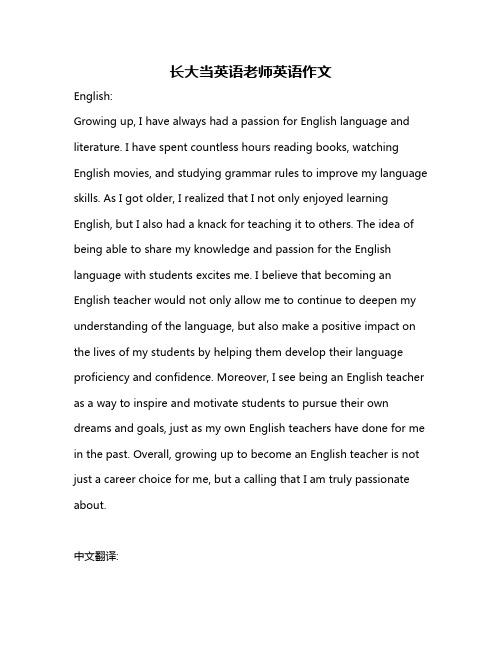
长大当英语老师英语作文English:Growing up, I have always had a passion for English language and literature. I have spent countless hours reading books, watching English movies, and studying grammar rules to improve my language skills. As I got older, I realized that I not only enjoyed learning English, but I also had a knack for teaching it to others. The idea of being able to share my knowledge and passion for the English language with students excites me. I believe that becoming an English teacher would not only allow me to continue to deepen my understanding of the language, but also make a positive impact on the lives of my students by helping them develop their language proficiency and confidence. Moreover, I see being an English teacher as a way to inspire and motivate students to pursue their own dreams and goals, just as my own English teachers have done for me in the past. Overall, growing up to become an English teacher is not just a career choice for me, but a calling that I am truly passionate about.中文翻译:随着我长大,我一直对英语语言和文学充满热情。
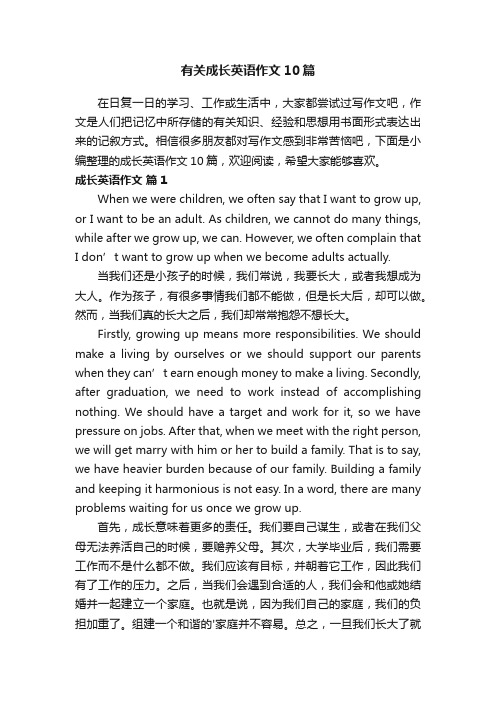
有关成长英语作文10篇在日复一日的学习、工作或生活中,大家都尝试过写作文吧,作文是人们把记忆中所存储的有关知识、经验和思想用书面形式表达出来的记叙方式。
相信很多朋友都对写作文感到非常苦恼吧,下面是小编整理的成长英语作文10篇,欢迎阅读,希望大家能够喜欢。
成长英语作文篇1When we were children, we often say that I want to grow up, or I want to be an adult. As children, we cannot do many things, while after we grow up, we can. However, we often complain that I don’t want to grow up when we become adults actually.当我们还是小孩子的时候,我们常说,我要长大,或者我想成为大人。
作为孩子,有很多事情我们都不能做,但是长大后,却可以做。
然而,当我们真的长大之后,我们却常常抱怨不想长大。
Firstly, growing up means more responsibilities. We should make a living by ourselves or we should support our parents when they can’t earn enough money to make a living. Secondly, after graduation, we need to work instead of accomplishing nothing. We should have a target and work for it, so we have pressure on jobs. After that, when we meet with the right person, we will get marry with him or her to build a family. That is to say, we have heavier burden because of our family. Building a family and keeping it harmonious is not easy. In a word, there are many problems waiting for us once we grow up.首先,成长意味着更多的责任。

渴望长大的英文作文英文:As a child, I always wanted to grow up quickly. I was fascinated by the idea of being an adult and having all the freedom and independence that came with it. However, as I have gotten older, I have come to realize that growing upis not always as glamorous as it seems.One of the biggest challenges of growing up is the responsibility that comes with it. As a child, I never had to worry about paying bills, managing my finances, or making important life decisions. However, as an adult, these responsibilities fall squarely on my shoulders. While it can be empowering to take charge of my own life, it can also be overwhelming at times.Another challenge of growing up is the realization that life is not always fair. As a child, I believed that if I worked hard and did the right thing, everything would fallinto place. However, as an adult, I have come to realize that life is full of ups and downs, and sometimes bad things happen to good people. Learning to navigate these challenges can be difficult, but it is an important part of growing up.Despite these challenges, I still believe that growing up is a necessary and important part of life. It allows us to gain independence, learn from our mistakes, and become the best version of ourselves. While I may sometimes long for the simplicity of childhood, I know that growing up has made me stronger and more resilient.中文:作为一个孩子,我总是想尽快长大。

长大后想当英语作文英文英文:When I grow up, I want to be an English writer. I have always been fascinated by the power of words and the way they can be used to create stories and evoke emotions. Writing in English allows me to reach a wider audience and connect with people from all over the world.I believe that being an English writer requires not only a strong command of the language, but also a deep understanding of culture and society. I plan to immerse myself in English literature and popular culture, as well as travel to English-speaking countries to gain firsthand experience and insights.In addition, I know that writing is a craft that requires constant practice and refinement. I will dedicate myself to writing every day, whether it be journaling, blogging, or working on a novel. I will also seek feedbackand guidance from experienced writers to help me improve my skills.Ultimately, my goal as an English writer is to create works that inspire and resonate with readers. I want totell stories that capture the human experience and explore the complexities of life in a way that is both entertaining and thought-provoking.中文:当我长大后,我想成为一名英语作家。

my changes高一英语精选作文导语:小编精心整理了大量高一英语优秀精选作文,希望大家能从中获益,在高一阶段打好英语写作基础。
There is a saying,Agirl changes fast in physical appearance from childhood to adulthood. Ijust had my eighteen years birthday. Its certain that I have grown much more beautiful now.(laugh) My biggest change is not the appearance but in mind. I have become much more mature. Idont always think about going out to play instead of focusing my attention on study. I start considering my future. I try my best not to quarel with my parents as I know what they do is for me. I know I should filial my parents. Whats more, I dont bully my younger sister and brother any more. I have changed a lot, because I have grown up.俗话说,女大十八变。
我刚刚过完我的十八岁生日。
我肯定是变得更美了。
(笑)我最大的改变不是在外貌上而是在思想上。
我变得更加的成熟。
我不再总是想着去玩而是把注意力放在学习上。
我开始思考我的将来。
我尽量不和父母吵架,因为我知道他们所做的都是为了我。
我懂得了要孝敬父母。
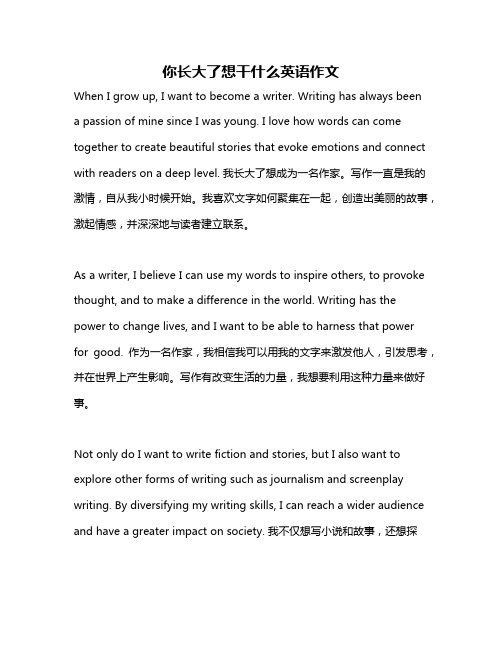
你长大了想干什么英语作文When I grow up, I want to become a writer. Writing has always been a passion of mine since I was young. I love how words can come together to create beautiful stories that evoke emotions and connect with readers on a deep level. 我长大了想成为一名作家。
写作一直是我的激情,自从我小时候开始。
我喜欢文字如何聚集在一起,创造出美丽的故事,激起情感,并深深地与读者建立联系。
As a writer, I believe I can use my words to inspire others, to provoke thought, and to make a difference in the world. Writing has the power to change lives, and I want to be able to harness that powerfor good. 作为一名作家,我相信我可以用我的文字来激发他人,引发思考,并在世界上产生影响。
写作有改变生活的力量,我想要利用这种力量来做好事。
Not only do I want to write fiction and stories, but I also want to explore other forms of writing such as journalism and screenplay writing. By diversifying my writing skills, I can reach a wider audience and have a greater impact on society. 我不仅想写小说和故事,还想探索其他形式的写作,如新闻写作和剧本创作。

长大后当老师英语作文As I ponder upon the question of what I aspire to be when I grow up, my heart resonates with the idea of becoming an English teacher. Teaching English is not merely a profession, but a passion that I harbor deep within my soul. The prospect of imparting knowledge, nurturing young minds, and instilling a love for language fills me with profound enthusiasm and purpose.First and foremost, the role of an English teacher is to facilitate effective communication. English serves as a global language, connecting people from diverse cultures and backgrounds. As an English teacher, I would strive to equip my students with the linguistic skills necessary to express themselves confidently and articulately in both spoken and written forms. Through engaging lessons, interactive activities, and immersive experiences, I aim to foster proficiency in grammar, vocabulary, pronunciation, and comprehension.Furthermore, I view the classroom not merely as a space for instruction, but as a community for intellectual growth and personal development. Beyond teaching language skills,I aspire to cultivate critical thinking, creativity, and cultural awareness among my students. By introducing themto literature, poetry, and various forms of media, I seekto broaden their horizons, ignite their imagination, and encourage them to explore the richness of the English language.In addition to academic endeavors, I believe in the importance of nurturing emotional intelligence and empathyin students. As an English teacher, I would create a supportive and inclusive learning environment where every student feels valued, respected, and empowered to express their thoughts and feelings. Through meaningful discussions, reflective writing prompts, and collaborative projects, I aim to foster empathy, tolerance, and understanding amongmy students, thereby nurturing compassionate and socially responsible individuals.Furthermore, I recognize the pivotal role of technologyin modern education. In today's digital age, technology offers boundless opportunities for innovation and engagement in the classroom. As an English teacher, I would harness the power of digital tools, educational apps, and online resources to enhance the learning experience, caterto diverse learning styles, and facilitate personalized instruction. By integrating multimedia elements,interactive exercises, and virtual simulations into my lessons, I aim to create dynamic and immersive learning experiences that captivate and inspire my students.Moreover, I believe in the importance of ongoing professional development and lifelong learning. As an English teacher, I am committed to staying abreast of the latest pedagogical trends, educational research, and technological advancements in the field of language teaching. Through participation in workshops, conferences, and online courses, I seek to refine my teaching strategies, expand my repertoire of instructional techniques, and continuously improve my practice as an educator.In conclusion, the prospect of becoming an Englishteacher fills me with a sense of purpose, fulfillment, and excitement for the journey ahead. By fostering language proficiency, critical thinking, cultural awareness, and empathy, I aspire to empower my students to thrive in an increasingly interconnected and multicultural world. As I embark on this noble endeavor, I am inspired by the words of Henry Adams: "A teacher affects eternity; he can never tell where his influence stops." It is my fervent hope that as an English teacher, I can make a positive and lasting impact on the lives of my students, helping them realize their full potential and become confident, compassionate, and articulate individuals.。

以长大为主题的英语作文English:Growing up is a journey filled with challenges, opportunities, and self-discovery. As we transition from childhood to adulthood, we experience physical, emotional, and psychological changes that shape our identity and character. We learn to take on more responsibilities, make independent decisions, and face the consequences of our actions. With each passing year, we gain wisdom, maturity, and a deeper understanding of the world around us. Growing up also involves facing uncertainties, overcoming obstacles, and finding our place in society. It is a time of transformation and growth, where we learn valuable life lessons, develop important skills, and build lasting relationships. Ultimately, growing up is a process of becoming the best version of ourselves and realizing our full potential.Translated content:成长是一段充满挑战、机遇和自我发现的旅程。
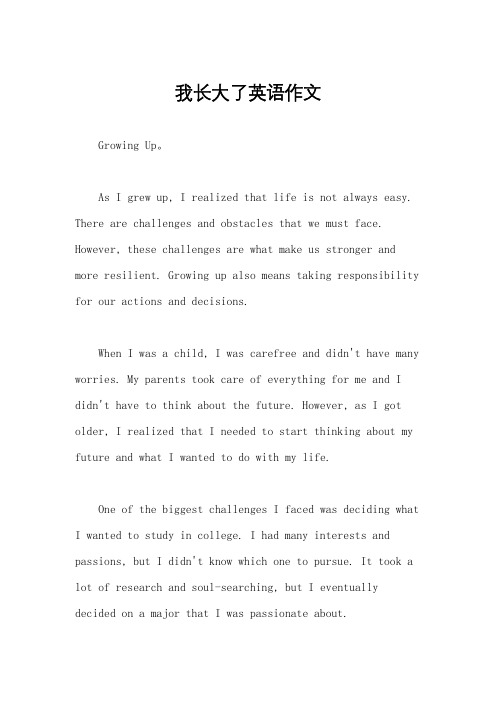
我长大了英语作文Growing Up。
As I grew up, I realized that life is not always easy. There are challenges and obstacles that we must face. However, these challenges are what make us stronger and more resilient. Growing up also means taking responsibility for our actions and decisions.When I was a child, I was carefree and didn't have many worries. My parents took care of everything for me and I didn't have to think about the future. However, as I got older, I realized that I needed to start thinking about my future and what I wanted to do with my life.One of the biggest challenges I faced was deciding what I wanted to study in college. I had many interests and passions, but I didn't know which one to pursue. It took a lot of research and soul-searching, but I eventually decided on a major that I was passionate about.Another challenge I faced was finding a job after college. The job market was competitive and it wasdifficult to find a job in my field. However, I didn't give up and eventually landed a job that I love.Growing up also means learning from our mistakes. I have made many mistakes in my life, but I have learned from them and become a better person because of them. I have also learned to take responsibility for my actions and not blame others for my mistakes.In conclusion, growing up is a journey that is filled with challenges and obstacles. However, it is also a journey that is filled with opportunities and growth. We must learn from our mistakes, take responsibility for our actions, and never give up on our dreams.。

长大后的英语作文Growing Up。
Growing up is a process that everyone goes through. It involves physical, emotional, and mental changes that shape us into the person we become. As we grow up, we learn valuable life lessons, gain new experiences, and developour own unique perspective on the world.Physically, we go through many changes as we grow up. Our bodies grow taller, stronger, and more mature. We develop new skills and abilities, such as walking, running, and riding a bike. We also learn how to take care of ourselves, like brushing our teeth and getting dressed on our own.Emotionally, growing up can be a rollercoaster ride. We experience a wide range of emotions, from joy andexcitement to sadness and anger. We learn how to deal with these emotions and how to express ourselves in healthy ways.We also develop empathy and compassion for others, which helps us build strong relationships.Mentally, growing up is a time of learning and discovery. We go to school and learn about the world around us. We develop critical thinking skills and learn how to solve problems. We also discover our passions and interests, which can shape our future careers and goals.One of the most important things we learn as we grow up is the value of hard work and perseverance. We learn that success doesn't come easy and that we have to work hard to achieve our goals. We also learn that failure is a natural part of the process and that we can learn from our mistakes.Another important lesson we learn is the importance of relationships. We learn how to build and maintain friendships, how to communicate effectively, and how to resolve conflicts. We also learn the value of family andthe importance of staying connected to our loved ones.In conclusion, growing up is a complex process thatinvolves physical, emotional, and mental changes. It is a time of learning, discovery, and self-discovery. As we grow up, we learn valuable life lessons, gain new experiences, and develop our own unique perspective on the world.。
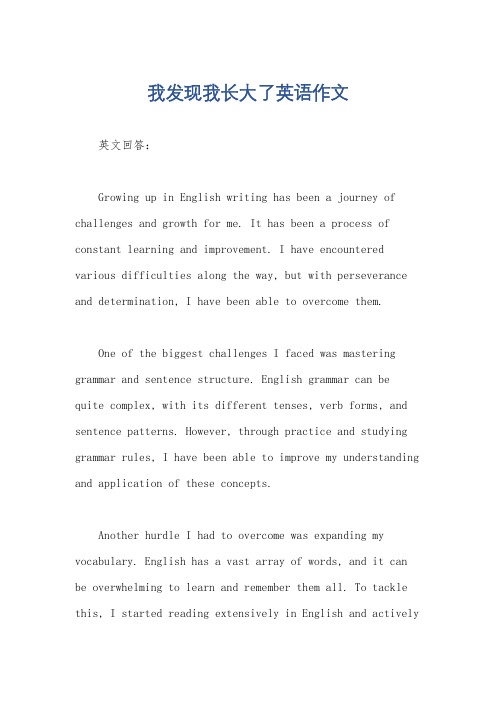
我发现我长大了英语作文英文回答:Growing up in English writing has been a journey of challenges and growth for me. It has been a process of constant learning and improvement. I have encountered various difficulties along the way, but with perseverance and determination, I have been able to overcome them.One of the biggest challenges I faced was mastering grammar and sentence structure. English grammar can be quite complex, with its different tenses, verb forms, and sentence patterns. However, through practice and studying grammar rules, I have been able to improve my understanding and application of these concepts.Another hurdle I had to overcome was expanding my vocabulary. English has a vast array of words, and it can be overwhelming to learn and remember them all. To tackle this, I started reading extensively in English and activelysought out new words. I also made it a habit to use a dictionary to look up unfamiliar words and phrases. Gradually, my vocabulary grew and I became more confidentin my writing.Additionally, writing coherent and cohesive essays wasa challenge for me. I had to learn how to structure myideas and arguments logically, ensuring that each paragraph flowed smoothly into the next. I also had to develop myskills in providing supporting evidence and examples to strengthen my points. Through practice and feedback from teachers and peers, I have been able to enhance my essay writing skills.中文回答:在英语写作中的成长对我来说是一段充满挑战和成长的旅程。
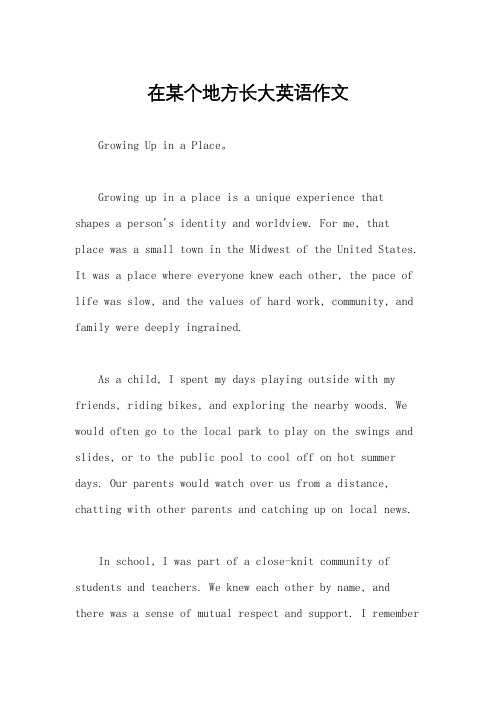
在某个地方长大英语作文Growing Up in a Place。
Growing up in a place is a unique experience that shapes a person's identity and worldview. For me, that place was a small town in the Midwest of the United States. It was a place where everyone knew each other, the pace of life was slow, and the values of hard work, community, and family were deeply ingrained.As a child, I spent my days playing outside with my friends, riding bikes, and exploring the nearby woods. We would often go to the local park to play on the swings and slides, or to the public pool to cool off on hot summer days. Our parents would watch over us from a distance, chatting with other parents and catching up on local news.In school, I was part of a close-knit community of students and teachers. We knew each other by name, and there was a sense of mutual respect and support. I rememberparticipating in school plays, talent shows, and sports teams, all of which brought our community together and fostered a sense of pride in our town.As I grew older, I began to appreciate the beauty of the natural surroundings. The rolling hills, vast fields, and colorful foliage in the fall were a constant reminder of the changing seasons and the passage of time. I would often take long walks by myself, listening to the sound of the wind and the birds, and feeling a sense of peace and connection to the world around me.Despite the many positive aspects of growing up in a small town, there were also challenges. The limited opportunities for cultural and intellectual stimulation, the lack of diversity, and the pressure to conform to traditional values and norms were all obstacles that I had to navigate. However, I believe that these challenges also helped me develop resilience, empathy, and a sense of curiosity about the wider world.Looking back on my childhood, I feel grateful for theexperiences and lessons that growing up in a small town provided. It gave me a strong sense of community, a deep appreciation for nature, and a foundation of values that have guided me throughout my life. While I have since moved away and experienced different cultures and ways of life, I will always carry a piece of my hometown with me.。
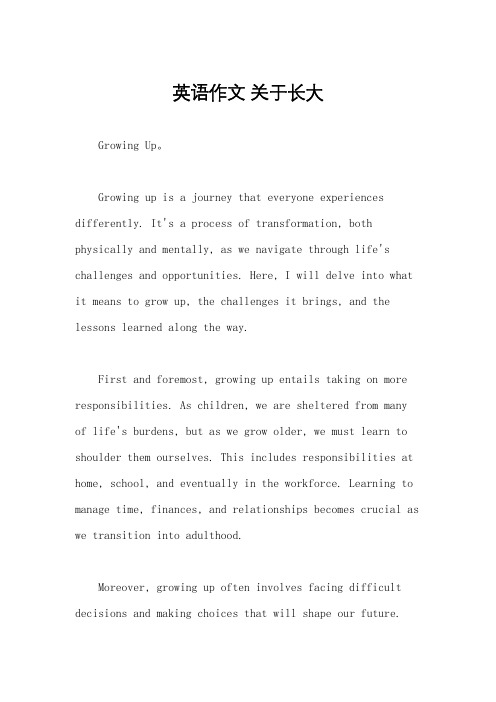
英语作文关于长大Growing Up。
Growing up is a journey that everyone experiences differently. It's a process of transformation, both physically and mentally, as we navigate through life's challenges and opportunities. Here, I will delve into what it means to grow up, the challenges it brings, and the lessons learned along the way.First and foremost, growing up entails taking on more responsibilities. As children, we are sheltered from many of life's burdens, but as we grow older, we must learn to shoulder them ourselves. This includes responsibilities at home, school, and eventually in the workforce. Learning to manage time, finances, and relationships becomes crucial as we transition into adulthood.Moreover, growing up often involves facing difficult decisions and making choices that will shape our future.From choosing a career path to deciding on personal values and beliefs, each decision contributes to our growth and development. These choices can be daunting, but they also offer opportunities for self-discovery and growth.Another aspect of growing up is gaining independence.As we mature, we seek autonomy and the freedom to make our own decisions. This independence allows us to explore our interests, pursue our goals, and forge our own path in life. However, with independence comes the need for accountability, as we must take responsibility for the consequences of our actions.Furthermore, growing up involves facing challenges and overcoming obstacles. Whether it's academic struggles, relationship issues, or setbacks in our careers, these challenges test our resilience and determination. Overcoming adversity teaches us valuable lessons about perseverance, problem-solving, and resilience, which are essential skills for navigating adulthood.Additionally, growing up means developing a deeperunderstanding of ourselves and the world around us. As we gain life experiences, we learn about our strengths, weaknesses, and aspirations. We also become more aware of the complexities of society and the diverse perspectives of others. This awareness fosters empathy, tolerance, and a broader worldview.Despite the inevitable challenges of growing up, it is also a time of tremendous growth and personal development. Through our experiences, we learn valuable life lessonsthat shape us into the individuals we are meant to become. We learn to embrace change, adapt to new circumstances, and continue to grow throughout our lives.In conclusion, growing up is a multifaceted journey characterized by responsibility, independence, challenges, and self-discovery. It's a process of maturation that involves navigating through life's ups and downs while learning valuable lessons along the way. Ultimately, growing up is about embracing change and becoming the best version of ourselves.。
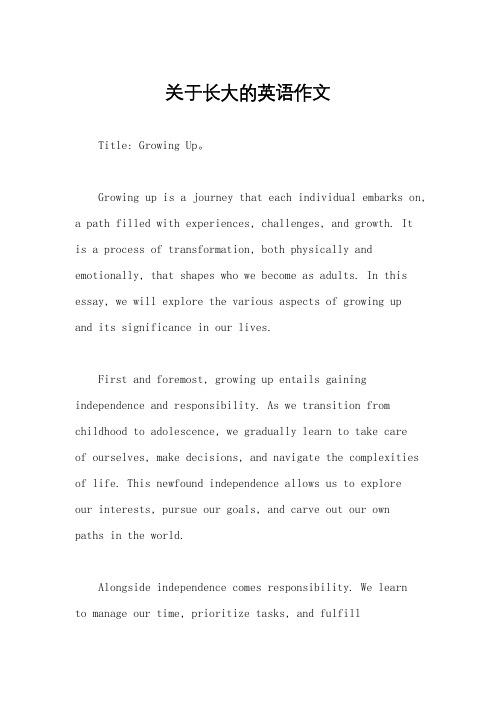
关于长大的英语作文Title: Growing Up。
Growing up is a journey that each individual embarks on, a path filled with experiences, challenges, and growth. Itis a process of transformation, both physically and emotionally, that shapes who we become as adults. In this essay, we will explore the various aspects of growing upand its significance in our lives.First and foremost, growing up entails gaining independence and responsibility. As we transition from childhood to adolescence, we gradually learn to take careof ourselves, make decisions, and navigate the complexities of life. This newfound independence allows us to exploreour interests, pursue our goals, and carve out our ownpaths in the world.Alongside independence comes responsibility. We learnto manage our time, prioritize tasks, and fulfillobligations. Whether it's completing school assignments, helping out at home, or holding down a part-time job, each responsibility teaches us valuable lessons about accountability and commitment.Furthermore, growing up involves developing a sense of identity and self-awareness. During our formative years, we explore our likes and dislikes, strengths and weaknesses, dreams and aspirations. We may experiment with different hobbies, interests, and friend groups as we strive to discover who we are and where we belong.Self-discovery is often accompanied by periods of introspection and self-reflection. We contemplate our values, beliefs, and principles, seeking to align our actions with our innermost convictions. This process ofself-examination helps us cultivate a strong sense of identity and purpose, laying the foundation for personal growth and fulfillment.In addition to individual growth, growing up also entails building relationships and fostering connectionswith others. As we mature, we form bonds with family, friends, mentors, and romantic partners, enriching ourlives with love, companionship, and support. These relationships provide us with a sense of belonging and community, nurturing our emotional well-being and helpingus navigate life's challenges.Moreover, growing up involves facing obstacles and overcoming adversity. Life is rarely smooth sailing, and along the way, we encounter setbacks, failures, and hardships. Whether it's academic struggles, personal losses, or career setbacks, each challenge presents an opportunity for growth and resilience. By learning to adapt, persevere, and bounce back from adversity, we emerge stronger, wiser, and more resilient individuals.Ultimately, growing up is a lifelong journey of self-discovery, personal development, and transformation. It isa process that continues throughout our lives, as we learn, evolve, and adapt to the ever-changing world around us. While the path to adulthood may be filled with twists and turns, ups and downs, it is through these experiences thatwe truly come into our own, embracing the challenges and opportunities that come with growing up.。

英语四级作文题目成长Growing up。
As we grow up, we encounter different challenges and experiences that shape us into the person we are today. Some of these experiences can be positive, while others can be negative. However, regardless of the experience, we can always learn and grow from it.One of the most important things we learn as we grow up is responsibility. We learn to take responsibility for our actions and decisions, and we become more accountable for our own lives. This is an important lesson that helps us to become more independent and self-sufficient.Another important aspect of growing up is learning to cope with failure. Failure is a natural part of life, and we all experience it at some point. However, it is how we deal with failure that determines our success in life. We learn to pick ourselves up and try again, and we becomemore resilient in the face of adversity.As we grow up, we also become more aware of the world around us. We learn about different cultures and perspectives, and we become more open-minded and accepting of others. This is an important lesson that helps us to build stronger relationships and become better global citizens.Finally, growing up also involves learning to set goals and work towards them. We learn to prioritize our time and resources, and we become more focused and driven in achieving our dreams. This is an important lesson that helps us to achieve success and fulfillment in life.In conclusion, growing up is a journey that involves learning important life lessons and developing key skills. While it can be challenging at times, it is ultimately a rewarding experience that helps us to become the best version of ourselves.。
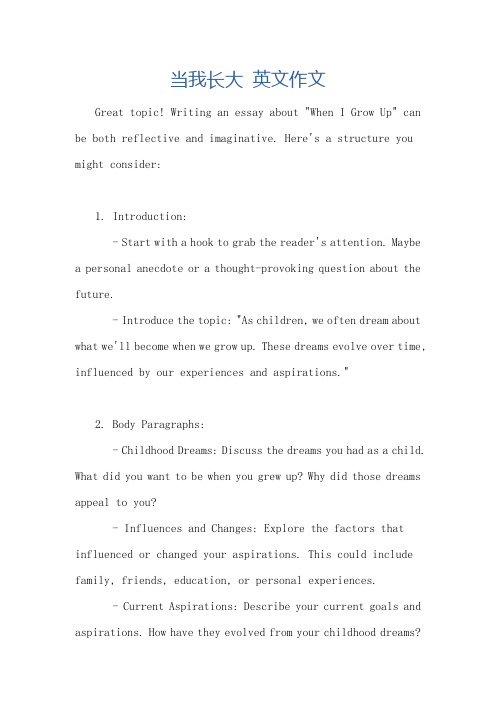
当我长大英文作文Great topic! Writing an essay about "When I Grow Up" can be both reflective and imaginative. Here's a structure you might consider:1. Introduction:- Start with a hook to grab the reader's attention. Maybe a personal anecdote or a thought-provoking question about the future.- Introduce the topic: "As children, we often dream about what we'll become when we grow up. These dreams evolve over time, influenced by our experiences and aspirations."2. Body Paragraphs:- Childhood Dreams: Discuss the dreams you had as a child. What did you want to be when you grew up? Why did those dreams appeal to you?- Influences and Changes: Explore the factors that influenced or changed your aspirations. This could include family, friends, education, or personal experiences.- Current Aspirations: Describe your current goals and aspirations. How have they evolved from your childhood dreams?What motivates you now?- Challenges and Opportunities: Discuss any challenges you anticipate or have encountered in pursuing your goals. Also, highlight the opportunities that excite you.- Personal Growth: Reflect on how your dreams and aspirations have contributed to your personal growth and development. What have you learned about yourself along the way?3. Conclusion:- Summarize your journey from childhood dreams to current aspirations.- Reflect on the significance of dreaming and evolving as you grow older.- End with a thought-provoking statement or a call to action for the readers to reflect on their own journeys.Remember to weave your personal experiences and insights throughout the essay to make it engaging and relatable. Good luck with your writing!。

英文作文长大后我想当英文:When I grow up, I want to be a writer. Writing has always been my passion, and I believe that I can use my words to make a difference in the world. I want to write about social issues, politics, and human interest stories.I want to be a voice for the voiceless and bring attentionto important issues that often go unnoticed.I also want to be a teacher. I believe that educationis the key to unlocking a person's potential, and I want to be a part of that process. I want to inspire my students to think critically, to question the world around them, and to never stop learning. I want to create a safe and inclusive environment where every student feels valued and respected.In addition to writing and teaching, I also want to travel. I want to explore different cultures, try new foods, and meet new people. I believe that travel is a great wayto broaden one's perspective and gain a deeper understanding of the world.中文:当我长大后,我想成为一名作家。

英语作文长大要当什么50字英文回答:When I grow up, I want to be a writer. I've always loved to write, and I can't imagine doing anything else. I love the feeling of getting lost in a story, and I love the challenge of creating something new. I want to be able to share my stories with the world, and I hope that my words will inspire others.I know that being a writer won't be easy, but I'm willing to work hard to achieve my dream. I'm going to keep writing, and I'm going to keep learning. I'm going to read as many books as I can, and I'm going to take every opportunity to improve my writing skills.I believe that anything is possible if you set your mind to it. And I'm determined to make my dream of becoming a writer a reality.中文回答:长大以后,我想成为一名作家。
我一直都热爱写作,我想象不出自己做其他任何事。
我热爱迷失在故事中的感觉,并且乐于接受创造新事物的挑战。

长大了英语作文Title: Embracing Growth: A Journey Through Adulthood。
As we journey through life, we inevitably encounter moments of transition and transformation. One of the most significant phases we undergo is the transition from adolescence to adulthood. This journey is marked by a myriad of experiences, challenges, and opportunities for growth. In this essay, I will delve into the nuances ofthis transformation and explore the facets of maturity and self-discovery.First and foremost, adulthood beckons us to take on greater responsibilities. Gone are the carefree days of childhood, replaced by the weight of obligations and commitments. Whether it be pursuing higher education, embarking on a career path, or starting a family, adulthood demands that we confront the realities of the world and assume accountability for our actions. This transition can be daunting, yet it is also empowering, as it enables us tocarve our own path and shape our destinies.Moreover, adulthood fosters a deeper sense of self-awareness and introspection. As we navigate the complexities of life, we are compelled to confront our beliefs, values, and aspirations. We grapple with existential questions about identity, purpose, and meaning, seeking to forge a sense of coherence and authenticity in our lives. This process of self-discovery is both enlightening and challenging, as it requires us to confront our strengths and weaknesses with honesty and humility.Furthermore, adulthood facilitates the cultivation of meaningful relationships and connections. We form bonds with peers, colleagues, and mentors who accompany us on our journey and enrich our lives with their presence. These relationships serve as sources of support, encouragement, and companionship, helping us navigate the highs and lows of adulthood with resilience and grace. Moreover, they provide opportunities for personal growth and development, as we learn from the diverse perspectives and experiences of those around us.In addition, adulthood offers opportunities for personal and professional development. We embark on a journey of continuous learning and growth, honing our skills, expanding our knowledge, and pursuing our passions. Whether through formal education, professional training, or personal enrichment activities, we strive to enhance our capabilities and unlock our full potential. This pursuit of excellence fuels our ambition and drives us to achieve our goals, both individually and collectively.Furthermore, adulthood presents us with challenges and obstacles that test our resilience and determination. From navigating career transitions to coping with financial pressures, we encounter setbacks and hardships that push us beyond our comfort zones. Yet, it is through adversity that we discover our inner strength and resourcefulness, learning to persevere in the face of adversity and emerge stronger and more resilient than before.In conclusion, the transition to adulthood is a transformative journey marked by growth, self-discovery,and empowerment. It challenges us to embrace responsibility, cultivate self-awareness, nurture meaningful relationships, and pursue personal and professional development. While the path may be fraught with challenges and uncertainties, itis also filled with opportunities for growth andfulfillment. As we embark on this journey, let us embrace the lessons of adulthood with courage, resilience, and optimism, knowing that each experience brings us one step closer to becoming the best version of ourselves.。
Why do students cheat?It is a rare individual who actively chooses to be dishonest. But why do a few students make compromising choices? What can lead people to act in ways that they aren't proud of? Below are some underlying beliefs and confusions which students at Carnegie Mellon give as explanations for slipping standards of integrity.A Victimless Crime?Students generally are familiar with the disciplinary actions and penalties for getting caught. However, they may fail to understand that one of the personal consequences of cheating and/or plagiarism is that they aren't actually learning or practicing the material. They may not realize that they will actually need and be accountable for certain knowledge and skills.Instructors may not explain the personal consequences and loss of trust that accompany academic dishonesty if they are focused mainly on stating the procedures and punishments related to academic disciplinary actions. They may not tell students how dishonesty damages their trust in a stude nt and his or her work which can affect a student’s ability to get a strong recommendation for employment or graduate school.It's a "Dog-Eat-Dog" UniversityStudents and their families often have very high expectations about grade achievements because they are accustomed to getting As. More pressure comes from the emphasis on grades in hiring and graduate admissions. Some students may feel pressured to develop unorthodox means to get competitive and marketable credentials.Instructors sometimes evaluate the performance of one student against the performance of others instead of measuring each student's achievement with respect to specified criteria. If students must compete with other students to get one of a limited number of As, they begin to look for ways to "get ahead."If Everyone Else Jumped in a Lake . . .Students sometimes view cheating as a necessary, not totally unacceptable method for academic survival. If they believe that "everyone cheats sometimes," they may not seriously ask themselves, "Why shouldn't I?"Professors and teaching assistants do not always confront suspected breaches of academic integrity. If they perceive that others do not pursue the formal process or that it is difficult to prove a breach has occurred, instructors may decide not to talk directly with students about potential problems. Instructors may no report an incident from their course believing that the student has “learned their lesson” but with no official record of the incident there is no way of knowing whether the student had cheated before or cheats again.Too Much Work, Too Little Time?Students often have multiple assignments due on the same day and in some courses may have only a few opportunities to demonstrate what they know. Cheating can be a tempting path when theyhave difficulty managing their time. Some may have little remorse because they rationalize "doing what it takes" to get all of their work done. One poor performance on a high-stakes assignment or feeling "shafted out of an A" by a curve may increase the perceived pressure to switch from honest work to questionable "shortcuts."Instructors often underestimate students' need for multiple assignments to get feedback, to receive a fair grade, and to stay motivated to learn. Sometimes in an effort to reduce the workload, they may not think about the intense pressure on students when a course grade is based only on a midterm and a final. Or, in an effort to provide lots of timely practice and feedback, others may lose track of how much pressure students feel to meet deadlines.The Past is Passed OnStudents are accustomed to sharing their work from past semesters with others and using friends' old exams to study, and they are often encouraged to do so. But the limits of a good learning strategy can be stretched too far if students "borrow" from papers, homework sets or lab reports done by other students.Instructors often do a good job of varying exam questions and assignments from semester to semester. But they may begin to resent the time and suspicion involved in altering effective materials just to take precautions against potential cheating or plagiarism. Even if specific instructions are given for students not to access past materials, students report that past materials are very easy to come by and often too alluring to pass up.Do We Have to Spell Everything Out?Students recognize the obvious examples of academic dishonesty such as copying during an exam or quoting extensively without a citation. They can be much less clear on how much collaboration is allowed, what kind of paraphrasing is appropriate to summarize a source or whether one assignment can be turned in for two different classes. If students are not accustomed to thinking about the ownership of ideas, they tend to underreport their sources.Instructors often state their expectations for tests and about quoting, footnoting, and paraphrasing in papers and they outline the consequences of being dishonest. However, they may not state precisely what they consider to be appropriate collaboration (if any) and what they recommend as guidelines for teamwork.Confused about whether an initial discussion has to lead to a charge of dishonesty and a potentially long procedure (it doesn't). Instructors may also be reluctant to approach a student about questionable work without solid evidence because they don't want to make unwarranted accusationsANAL YZEBelow are some underlying beliefs and confusions which students at Carnegie Mellon give as explanations for slipping standards of integrity.n.(direction) + be + subject.This kind of structure makes the style of sentences more colorful.Sometimes in an effort to reduce the workload, they may not think about the intense pressure on students when a course grade is based only on a midterm and a final. Prep. At the beginning.This kind of structure makes the style of sentences more colorful. It changes the rhythm of the paragraph.Confused about whether an initial discussion has to lead to a charge of dishonesty and a potentially long procedure (it doesn't).Past participle at the beginning adds to the styles of sentences.Instructors often meet students' need for multiple assignments to get feedback, to receive a fair grade, and to stay motivated to learn.Sth meet sb's need.This structure makes the expression more typical.。